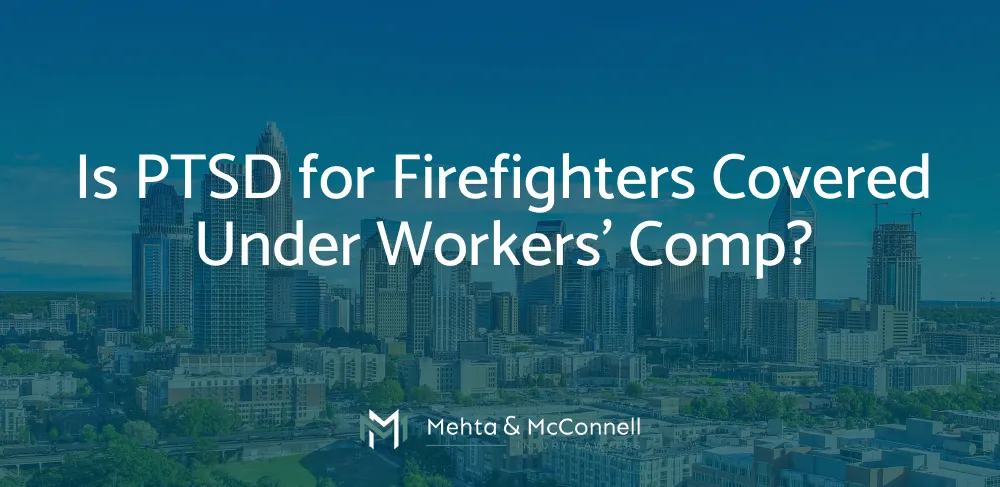 Workers' Compensation
Workers' Compensation
Yes, in some cases, firefighters can receive PTSD workers’ comp benefits.
PTSD stands for post-traumatic stress disorder, which can result in symptoms like intrusive memories, avoidance behaviors, and heightened alertness that profoundly impact their daily functioning and career longevity.
North Carolina’s firefighters and other first responders have constant proximity to life-threatening, highly stressful situations, which places them at an elevated risk for developing PTSD.
While workers’ compensation can offer some assistance for PTSD, it’s not an automatic benefit.
If you or someone you love is a firefighter facing PTSD, hiring an experienced North Carolina workers’ compensation lawyer is your best shot at compensation.
At Mehta & McConnell, PLLC, we understand first responders’ challenges when presenting a workers’ compensation claim for PTSD benefits.
Legislative Updates: HB 492 and North Carolina’s “Catch All” Provision
In 2021, the North Carolina House of Representatives passed H.B. 492, which would allow first responders to qualify for PTSD workers’ comp benefits.
However, it was not moved along and passed into law. Under H.B. 492, PTSD would be classified as a compensable occupational disease for first responders who work for local and state governments.
Under the bill, firefighters would need to undergo an examination and have a PTSD diagnosis from a qualified healthcare provider.
The provider must confirm within reasonable medical certainty that the first responder’s PTSD was caused by their employment.
In the absence of this law passing, a firefighter can only obtain workers’ comp benefits through the “catch-all” provision of North Carolina’s Workers’ Compensation Act.
Under the act, a firefighter must provide evidence of causation and show their employment created an increased risk of developing PTSD. H.B. 492 would’ve eliminated the legal requirement for first responders to prove their professions increase their risk of developing PTSD more than any other profession.
PTSD Firefighters Symptoms
PTSD in first responders is, unfortunately, more common than people realize. It’s important to recognize some of the most common PTSD symptoms.
Here are some of the most common symptoms related to PTSD and firefighters’ duties.
Intrusive Memories
Intrusive memories are one of the most common symptoms of PTSD. This is where someone relives the traumatic events repeatedly in their memories. It might manifest as flashbacks, disturbing thoughts, or nightmares about the incident.
Encountering situations that mirror or echo past traumatic incidents could result in reliving past traumatic incidents.
This recurrence of past trauma in the present magnifies emotional stress and can significantly debilitate a firefighter’s capacity to operate professionally and engage personally.
Avoidance Behaviors
Avoidance behaviors fundamentally alter how firefighters with PTSD interact with their environment. They may circumvent situations, places, or people that could trigger memories of their traumatic experiences.
This behavior can disrupt personal relationships and work, leading to emotional detachment and a cycle of isolation.
Negative Changes in Thoughts and Mood
Another symptom of PTSD in firefighters is a change in mood. Perhaps they have distorted beliefs about themselves, negative mood shifts, feelings of guilt, and a lack of interest in previous activities.
Heightened Arousal and Reactivity
Firefighters grappling with PTSD often have a heightened state of arousal and reactivity. That can result in interpersonal conflicts, disrupted sleep patterns, and psychological turmoil.
Remaining in this heightened state for too long can result in a chronic stress response. That can lead to additional health problems and concerns regarding work performance.
Additional Concerns with PTSD
Having PTSD can increase the risk of developing other mental health problems, such as alcohol and drug use, depression, and suicidal thoughts.
PTSD doesn’t always appear immediately following a traumatic event, either. It could take months or even years.
Because there are no protections in place for first responders when it comes to pursuing workers’ comp benefits, the administrator may argue that these symptoms are independent of any traumatic experiences on the job.
That’s why you should consider speaking with an experienced workers’ comp attorney who can help.
Examples of Situations That Could Lead to PTSD in First Responders
To better understand how PTSD develops in first responders, here are some examples of situations that could lead to a firefighter developing PTSD:
- Approaching the scene of a vehicle collision involving a child’s death,
- Responding to a house fire that ultimately results in one or more deaths,
- Seeing another firefighter die in the line of duty, or
- Witnessing an explosion that kills multiple people.
It’s also possible that some firefighters might develop PTSD over time, not necessarily from one single traumatic incident but a culmination of multiple experiences.
Necessary Elements to Prove PTSD for Workers’ Compensation in North Carolina
To receive workers’ comp benefits for PTSD, North Carolina requires a firefighter to prove the following:
- PTSD is a characteristic of working as a firefighter,
- Working as a firefighter exposes the person to a greater risk of developing PTSD when compared to a member of the general public, and
- Demonstrate a causal link between firefighting and PTSD.
While meeting these requirements might seem simple, they can be complicated to identify sometimes. Part of that is because symptoms might not manifest immediately, and it can take months to receive a diagnosis.
Workers’ comp administrators may argue that your diagnosis is unrelated to firefighting duties.
Fortunately, your attorney can help you build a solid case and identify all necessary evidence that supports your diagnosis.
Navigating the challenges of filing for workers’ comp benefits is tough but not impossible. Compiling evidence that supports a strong connection between your PTSD diagnosis and your job as a firefighter is crucial. One way you can help establish a causal link is by attending routine therapy.
If you have questions about applying for PTSD workers’ comp benefits in North Carolina, contact the experienced legal team at Mehta & McConnell, PLLC.
We have over 30 years of combined legal experience and know how to help file workers’ compensation PTSD claims in North Carolina.
As prior insurance defense attorneys, we also understand how insurance companies work.
Please get in touch with our office today to schedule a consultation. Let us review your case and help you pursue the benefits you deserve.

